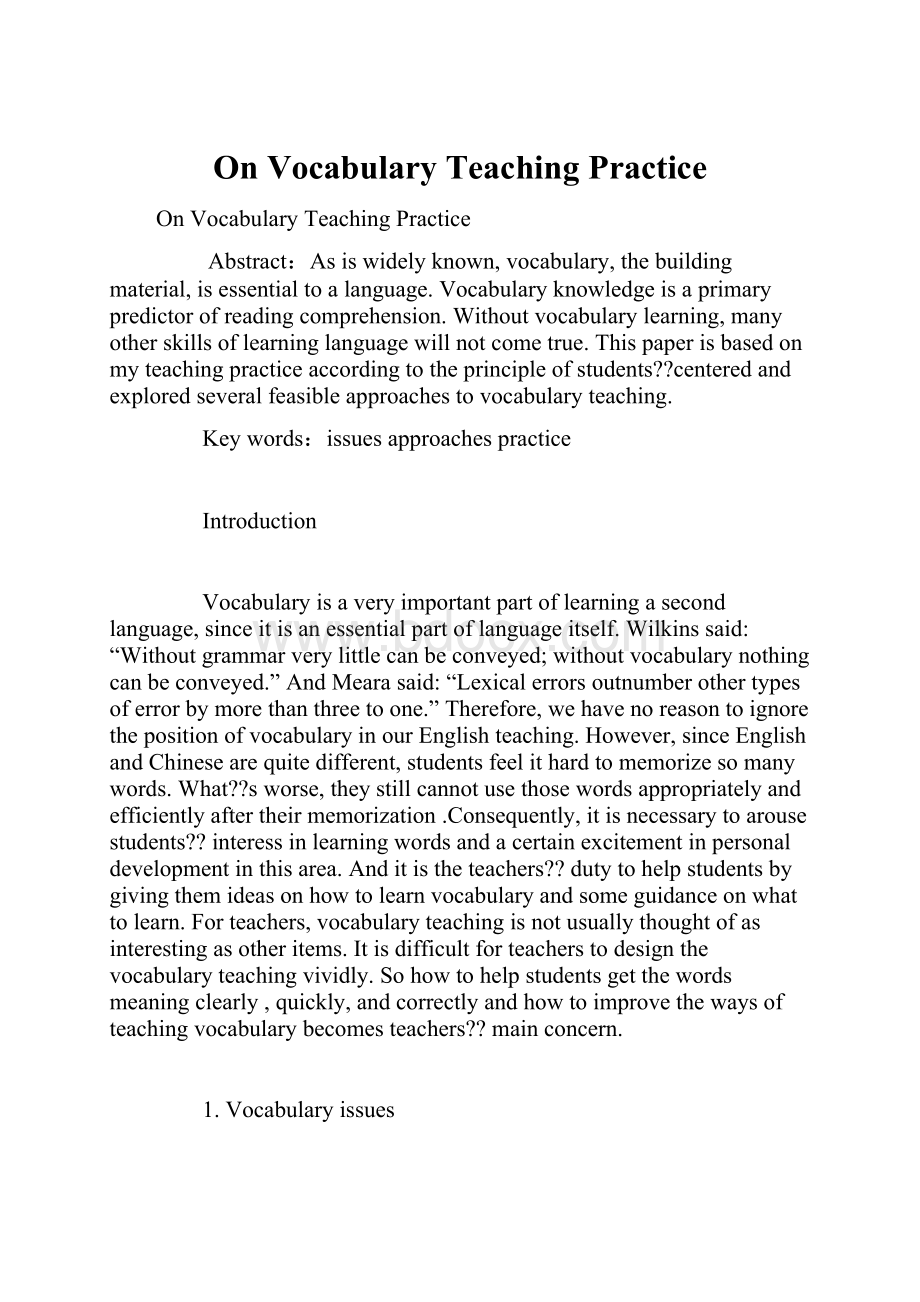On Vocabulary Teaching Practice.docx
《On Vocabulary Teaching Practice.docx》由会员分享,可在线阅读,更多相关《On Vocabulary Teaching Practice.docx(8页珍藏版)》请在冰豆网上搜索。

OnVocabularyTeachingPractice
OnVocabularyTeachingPractice
Abstract:
Asiswidelyknown,vocabulary,thebuildingmaterial,isessentialtoalanguage.Vocabularyknowledgeisaprimarypredictorofreadingcomprehension.Withoutvocabularylearning,manyotherskillsoflearninglanguagewillnotcometrue.Thispaperisbasedonmyteachingpracticeaccordingtotheprincipleofstudents?
?
centeredandexploredseveralfeasibleapproachestovocabularyteaching.
Keywords:
issuesapproachespractice
Introduction
Vocabularyisaveryimportantpartoflearningasecondlanguage,sinceitisanessentialpartoflanguageitself.Wilkinssaid:
“Withoutgrammarverylittlecanbeconveyed;withoutvocabularynothingcanbeconveyed.”AndMearasaid:
“Lexicalerrorsoutnumberothertypesoferrorbymorethanthreetoone.”Therefore,wehavenoreasontoignorethepositionofvocabularyinourEnglishteaching.However,sinceEnglishandChinesearequitedifferent,studentsfeelithardtomemorizesomanywords.What?
?
sworse,theystillcannotusethosewordsappropriatelyandefficientlyaftertheirmemorization.Consequently,itisnecessarytoarousestudents?
?
interessinlearningwordsandacertainexcitementinpersonaldevelopmentinthisarea.Anditistheteachers?
?
dutytohelpstudentsbygivingthemideasonhowtolearnvocabularyandsomeguidanceonwhattolearn.Forteachers,vocabularyteachingisnotusuallythoughtofasinterestingasotheritems.Itisdifficultforteacherstodesignthevocabularyteachingvividly.Sohowtohelpstudentsgetthewordsmeaningclearly,quickly,andcorrectlyandhowtoimprovethewaysofteachingvocabularybecomesteachers?
?
mainconcern.
1.Vocabularyissues
Thereareavarietyofproblemsinthecurrentvocabularyteachinginourcountry.Firstofall,sometextbooksappeartobetellingteachersthatstudentscouldlearnallthewordstheyneededwithouthelp.Infact,teachersaresometimestoldthattheyoughtnottoteachmanywordsbeforetheirstudentshadmasteredthegrammarandthesoundsystemoflanguage.Injournalarticlesforteachers,vocabularywasseldommentioned.Pronunciationandgrammarwereemphasized,buttherewaslittleornoemphasisonvocabulary.Inshort,vocabularyhasbeenneglectedinprogramsforteachersduringmuchofthetwentiethcentury.Secondly,vocabularyistaughtbyfollowingthreeprinciples:
pronunciation,spellingandmeaning.Inthetext,vocabularyistaughthowtomakeupasentenceandthegrammaraboutit.What?
?
smore,thetestofvocabularyistomakestudentspronounceitanduseittomakeupsimplesentences.Therefore,aftermorethansixyears?
?
study,studentsknowmanywordsandsentencepatterns,butitissopitythattheycannotsayonecompletesentence.Althoughtheycanusethesimplewordstocommunicatewitheachother,theywillmakeamistakes.Manystudentsknowlittleaboutthedifferenceoftheculture,sotheycannotusetherightwordsintheverysituation.
Vocabularyinstructionisoftenachallengeissueinamainstreamclassroom.Teachersstruggletomakethevocabularyinstructiontomeettheneedsofthestudentswithvocabulariesrangingfrom500to3000.Theresultisthatwordstargetedforthegrade?
?
levelinstructionareoutofreachofthebeginninglevelEnglishstudents.Herearedifferentlevelsoftheknowledgeofwordunderstanding:
havingnoknowledge,havingageneralsenseofaword,havinganarrowcontext?
?
basedknowledge,havingaknowledgeofawordthatcan?
?
tbecalledtouseitinaappropriatesituationsandhavingdecontextualizedknowledgeofaword,itsrelationshiptootherwordsandhowitcanbeusedmetaphorically.Inviewofthat,I?
?
mmotivatedpersonallyandprofessionallytofindeffectivewaystoteachvocabularyandnarrowthevocabularygap.Asitisagreedthatanemphasisshouldbeputonhelpingstudentsacquiringasolidvocabularyfoundation.VocabularybuildingandpracticeshouldbeseenasacurriculumbecauseitplaysasignificantroleinEnglishlearning.
2.VocabularyteachingPractice
Thefeaturesofawordcannotbetaughtatonetime.Theyshouldbetaughtonsuitableoccasionsaccordingtothelevelsandneedsofthestudentsandcharacteristicsoftheword.However,forthestudents,perhapsitislessdifficulttolearnvocabularyitemsforthefirsttimethantoconsolidateandrememberthem.Itistoooftenthatwehearstudentscomplainthattheykeeplearningandforgetting.Somepeoplesayvocabularycannotbetaught,andthatitcanonlybelearnedbythestudents.Thisisperhapspartiallytrue.Whenstudentsstudyvocabularyindividually,veryoftenitisrotelearning,whoseeffectivenessisseldomguaranteed,particularlywhentheydonotfullyunderstandthemeaningofthevocabulary.Onlystudentsstudyvocabularytogether,sayingroups,throughvariousactivitiesandundertheteacher?
?
ssupervision,doesvocabularylearningbecomemorefunandeffective.Learningisalsomoreeffectivewhenstudentsunderstandthemeaningofthenewvocabulary.Belowaresomevocabularyconsolidationactivitiesorteachingpracticethatcanbedoneinclass.
2.1Activatingpriorknowledgeandbuildbackgroundknowledge
Priorknowledgethestudentsbringtoatextshouldbeactivatedanddrawnupontoincreasecomprehensionandvocabularyretention.It?
?
simportanttotapintothestudentspriorknowledgeinordertoprovideacontextfornewvocabularywords.Studentsbenefitfromconnectingconcretefromtheirpriorknowledgetotheabstractnewwordsandconceptstheyarelearning.Itprovideslabelsthatdevelopoutofexperiences.Theseexperienceshelptobuildbackgroundknowledgethestudentsneedtoknowtounderstandatext.Buildingstudents?
?
backgroundknowledgearoundagiventopicandprovidingfamiliarcontentreadingmaterialshelpsimprovetheirreadingcomprehensionability.
2.2Ensuringstudentsknowthemeaningofbasicwords
Somebasicwordsareeasytoteach,usingpictures,labeling,showingrealobjects,playingagame,employingdemonstration―explainthemeaningofthewordseitherthroughtheuseofrealityorinpictures.Thendemonstrationanactionisabetterway.Forexample,whentheteacherpresentstheconceptslikestretchingandwalking,heorshecanstretchorwalk.Manyactionverbs(sit,sneeze,dig,stumble,open,etc)canbepresentedbymiming.Someadjectiveslike“happy”“angry”“sleepy”canbetaughtbyusingfacialexpressionandgestures.Describingandanswering―Studentsareputintopairs.Onehasapicture;theotherhasablankpieceofpaperandapencil.Thestudentshavingthepicturemusttellhispartnerwhattodrawsothatthedrawingendsupthesameastheoriginalpicture.Thestudentmustnotshowthepictureuntilthedrawingiscompleted.
Basicvocabularyfoundationhelpsthemunderstandexplanationofacademicvocabularycominglater.
2.3Usingthewordinthecontext
Tolearnvocabularythroughcontextisanexcellentway,studentsuseappropriateguessingstrategieswhenencounteringunknownwords.TwaddellandmorerecentlyKrashenbotharguethatnon?
?
nativespeakerswillmostefficientlyincreasetheirvocabularythroughreading,ratherthanthroughdirectvocabularyteaching.Teachingvocabularythroughreadingmeanstoaskstudentstounderstandandlearnwordsfromcontext.Tostudents,itiseasytoknowthemeaningofthewordsaccordingtothecontext.Studentsshouldnotthinkmoreaboutgrammarwhentheyarereading.Thiskindofwayismoreinterestingthanjustwritingthewordsontheboardandexplainingthemtostudents.Itcanalsogivestudentsadeepimpression.
And,wealsoshouldguessmeaningfromcontext.Guessingmeaningofunfamiliarwordsorexpressionsfromcontextisnotanewidea.Theproblemishowstudentscandeveloptheabilitytodoso.Initiallystudentsneedtheteachershelpregardingwhatcontextualcluestolookforandhowthesecluescancontributetothediscovery(revealing)ofmeaning.Generallyspeaking,thetopic,thegrammaticalstructure,thepossiblemeaningconnectionbetweenthegivenwordandotherwordsandlinguisticpatternwherethewordappearsmaygivehintstothemeaninginonewayoranother,lookatanexample:
Thecaptainaskedtheseamentothrowthe[ZZ(Z]anchor.[ZZ)]
Ifstudentdoesnotknowthewordanchor,thereareenoughcluesforthemtoguessthemeaning.Whodoseamenusuallythrowanyway?
2.4Usingwordsbuildingtoteachwords
Withvocabularyincreasing,wecanlearnwordsbyanalyzingwordbuilding,whichcanhelpstudentstomemorizewordsbyunderstandingthemeaningofthewords.What?
?
smore,itishelpfulforstudentstoanalyzelanguagephenomenon.
Studentsshouldlearntodetectmorphemesinwords.Studentsdonotalwaysrealizethatwordsareconstructedofmorphemeswhichsharetheburdenofthemeaningamongthemveryclearly.Studentsshouldlearntodetectmorphemeswhichoccurinanumberofwordsandwhichcanhelpthemtoidentifyatleastpartofthemeaning,thusassistingtheminguessingfromcontextthemeaningofapparentlynewitemsasanaidtodiscoverthemeaningsofapparentlyunknownwordsthatcanbeinterestingandprofitable.Sensitivitytowordformationwillassistlanguagelearnersinextractingmeaningbymakingthemconsciousofthepartsofspeechtowhichwordsbelong.
1.Usingroots.Forexample,wecanguessthemeaningsofuseful,useless,userbyhavinglearntuse.Teacherscansay“useful”comesfromuse,itmeans“ofuse”.
2.Usingprefixes.Forexample,studentshavelearntthewordstellandwrite,ifteachersteachthemthemeaningoftheprefix?
病?
re?
病?
.Theywillknowtheotherwords.‘re